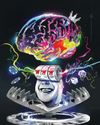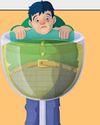
Are you, or is someone you know, ageing? Of course you are: though a handful of wellness influencers claim otherwise, the processes of biological ageing are ticking along within us all. But there’s good news – scientists now understand enough about those processes that we may one day be able to slow them down, or even reverse them. And that day might arrive sooner than you think.
While you should take the claims of social media biohackers with a very large pinch of salt, longevity science is beginning to uncover the mechanisms that make us grow old. It goes far beyond vanity – such scientists aren’t just trying to create new anti-ageing skin creams to smooth fine lines and wrinkles, but real anti-ageing medicines that will slow the advance of those biological processes happening inside all of us.
The biology of ageing essentially causes diseases like cancer, cardiovascular disease and dementia. For example, while having high blood pressure roughly doubles your chance of a heart attack, being aged 80 rather than 40 multiplies that risk by 10. That means understanding the biology behind these enormous risk increases could lead to the greatest revolution in medicine since the discovery of antibiotics. It could transform not just the treatment, but the prevention of disease in the first place.
The prize, if we can identify and treat these underlying causes of ageing, is enormous. If we could make people in middle age a bit biologically younger with drugs that address the ageing process, we could improve everything from heart health to wrinkles, and delay the onset of cancer, dementia and frailty, all at the same time.
Scientists have identified several so-called ‘hallmarks’ of the ageing process – underlying biological and biochemical processes that are common to multiple, different diseases and dysfunctions associated with old age. By tackling these hallmarks, we could potentially prevent many of these problems simultaneously.
Esta historia es de la edición September 2024 de BBC Science Focus.
Comience su prueba gratuita de Magzter GOLD de 7 días para acceder a miles de historias premium seleccionadas y a más de 9,000 revistas y periódicos.
Ya eres suscriptor ? Conectar
Esta historia es de la edición September 2024 de BBC Science Focus.
Comience su prueba gratuita de Magzter GOLD de 7 días para acceder a miles de historias premium seleccionadas y a más de 9,000 revistas y periódicos.
Ya eres suscriptor? Conectar

NOW YOU SEE ME, NOW YOU DON'T
Scientists around the world are working on ways to hide us from sight. But how close are we to developing tech that could make us invisible?

UNCORKED POTENTIAL
How much good can ditching drink for a month really do? Answer: a whole lot. In fact, science shows even short-term abstinence could unlock a cocktail of lasting benefits

Scientists discover when humans and dogs became friends
The relationship spans thousands of years, but experts might have pinpointed the first connection

Why it's so hard to kick a gambling addiction
We now know that gambling can be as addictive as drugs, but there are factors that can make it even harder to quit

How much could Ozempic change our world?
The weight-loss drug has made headlines and broken sales records, but what does it mean for our future?

WHY DOES DRINKING ALCOHOL MAKE IT SO MUCH HARDER TO LOSE WEIGHT?
While enjoying the occasional glass of wine or pint of beer may seem harmless, regular or excessive alcohol consumption can significantly hinder your weight-loss journey for a few reasons:

Why do so many New Year's resolutions fail?
Establishing positive new habits is hard at any time of year. But there are ways to stop your attempts ending in failure

'Extreme' solar radiation storm could hit Earth
Sun-like stars may have tantrums far more frequently than we thought

HOW CAN I BANISH THE JANUARY BLUES?
Dark mornings, long chilly evenings and short days; many people find January tough.

Neutrinos are getting in the way of dark matter detection
These troublesome particles are difficult to detect, but they're starting to show up in places where they're not wanted
